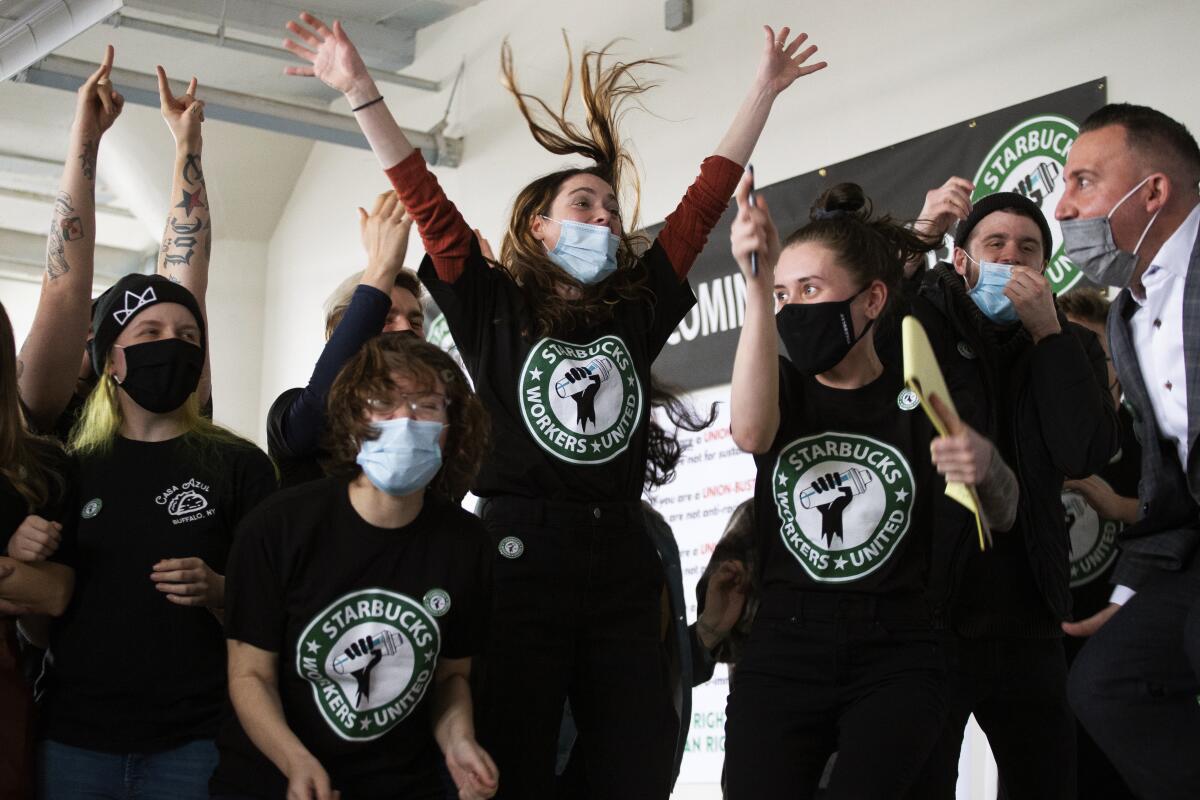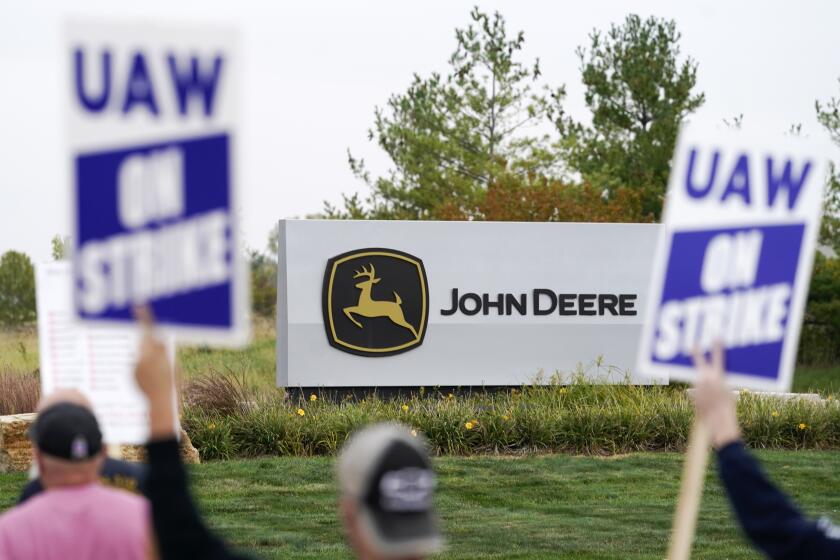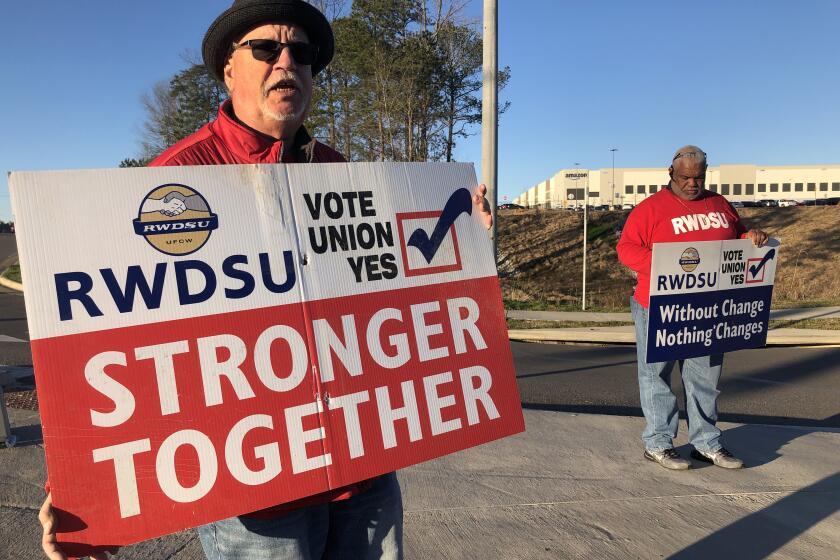Op-Ed: Why a union victory at a single Starbucks is a good sign for the labor movement

- Share via
Last week’s union victory at a single Starbucks in Buffalo, N.Y., may seem small, but it has huge symbolic importance. It is the only one of Starbucks’ more than 8,900 company-owned cafés in the United States to unionize, but it probably won’t be the last.
Nelson Lichtenstein, a labor historian at UC Santa Barbara, predicts that emboldened baristas at many more Starbucks across the U.S. — including perhaps in union-friendly cities like Los Angeles and San Francisco — could be inspired to rush to petition for union elections. The tiny acorn of a union victory in Buffalo could soon become a fast-growing oak in which workers across America’s service sector move toward union membership. And this, some labor experts say, could help reverse organized labor’s decline to just 1 in 10 U.S. workers.
The conditions for a labor resurgence are better than they’ve been in decades, but it still won’t be easy. Joe Biden is the most pro-union president since Franklin Roosevelt and often goes out of his way to boost unions, most recently condemning Kellogg’s use of permanent replacement workers to defeat a two-month-long strike. According to a recent Gallup poll, 68% of Americans approve of unions — the highest level in more than 50 years — and 77% of Americans aged 18 to 34 approve of unions. That, of course, is the age group of Starbucks workers.
An economic justice agenda and standing firm against two-tier pay systems are helping unions gain public respect.
Many young Americans, plagued by student debt and high rents, are frustrated with the inequitable economic system and are eager for change, and unionization is a way to bring about real change. It gives workers a stronger voice, a seat at the table, as well as collective power, to demand improvements in their pay and their working conditions.
The union victory in Buffalo came despite Starbucks’ fierce anti-union efforts, showing how far some corporations will go to keep out unions. After workers at three Starbucks stores in Buffalo petitioned to unionize with Workers United, a division of the Service Employees International Union, Starbucks dispatched executives and managers from around the country to work in those three cafés, including the president of Starbucks’ North American retail operations.
Starbucks said it sent the managers so they could listen to workers about their problems, but several pro-union workers said the heavy managerial presence was a way to intimidate them and spy on them. Union supporters also complained that Starbucks transferred new baristas into one store at the last minute to dilute support for the union when the workers voted.
Although one store voted 19-8 in favor of unionizing, workers at a second store voted 12-8 against unionizing. At the third store, the union was ahead, 15-9, but the vote was inconclusive because there were many still-to-be-counted challenged ballots.
If Starbucks workers seek to unionize at 50 or 100 stores in, say, 20 cities — including perhaps New York, Boston, Detroit, Minneapolis and Seattle, in addition to L.A. and San Francisco — the company would have a harder time mounting as intense an anti-union effort as it did in Buffalo, which would increase the workers’ chances of winning.
The order for a new union election for Amazon warehouse workers comes after a review of the company’s conduct during the union drive this year.
A few more union victories at Starbucks could inspire other service-sector workers to seek to unionize — perhaps at McDonald’s, Taco Bell, Applebee’s, Home Depot or Dollar General. Many workers who are unhappy with their pay and working conditions have not considered unionizing because they are afraid to stick their necks out and see little chance of a union drive succeeding. But the union victory in Buffalo could help overcome that hesitancy.
Of course, winning unionization elections against anti-union companies like Starbucks and Amazon is never easy. American law gives employers a huge advantage, permitting them to propagandize against a union 24/7 in the workplace. At the same time, companies can ban union organizers from setting foot on company property, as the Supreme Court ruled in June in a case involving California farmworkers. Moreover, U.S. law all but encourages anti-union employers to break the law when fighting unions because labor law doesn’t allow for any fines for such violations, no matter how egregious, including firing the workers leading the unionization effort.
Even with a successful union vote, Starbucks can still undermine the workers by dragging out contract negotiations for a year or two or three. The law doesn’t require employers to ever reach a first contract, though it does prohibit them from bargaining in “bad faith,” something that’s often hard to prove legally.
Still, the news from Buffalo creates a hopeful moment. Whenever a union wins at a highly visible, anti-union company, that opens up possibilities. The question now is whether many more workers will seize on this possibility as the best way to improve their workplaces.
Steven Greenhouse is the author of “Beaten Down, Worked Up: The Past, Present, and Future of American Labor.”
More to Read
A cure for the common opinion
Get thought-provoking perspectives with our weekly newsletter.
You may occasionally receive promotional content from the Los Angeles Times.












